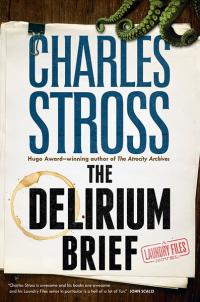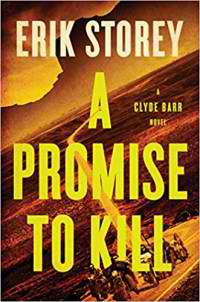The Delirium Brief by Charles Stross
 Monday, September 18, 2017 at 9:11AM
Monday, September 18, 2017 at 9:11AM 
Published by Macmillan/Tor.com on July 11, 2017
As a necromancer working for the government’s occult secret service, Bob “Eater of Souls” Howard is not a happy guy. His agency is no longer a secret. He’s been given a new title — Departmental Public Relations Officer — and his first assignment is an interview on Newsnight. His objective is to make his job at the Laundry sound boring. As series readers know, Bob’s job is far from boring. But much to Bob’s consternation, the Laundry is about to be disbanded in order to pave the way for an evil alien takeover, disguised a privatization.
The American Postal Service has been privatized in a conspiracy orchestrated by Nazgûl (a/k/a the Black Chamber a/k/a the Operational Phenomenology Agency) to shut down the Postal Inspector’s Occult Texts Division. The scheme calls for the Laundry to be the next victim of privatization, a plan that is embraced by the Prime Minister, who blames the Laundry for bringing ridicule upon his administration. Of course, it isn’t entirely Howard’s fault that the fight against occult horrors, once largely hidden from public view, gained public attention in The Nightmare Stacks.
After an attempted snatch-and-grab by the entity who calls himself Raymond Schiller — whose mind is now occupied by the sleeping god he awakened — Bob realizes he’s in more danger than usual. Bob’s new mission is to find out what Schiller is up to and to stop him, all without the official help of the Laundry, which on paper no longer exists.
The story turns Bob’s world upside down, forcing him to join forces with the sort of people he usually locks up, including a vampire and the Mandate. When he isn’t preoccupied by evil, he’s preoccupied by love, trying to find a way to stay married to Mo without inadvertently eating her soul. Which, I think, is pretty much a metaphor for marriage.
Eventually the story turns into a furious occult action novel, as various entities wield their various powers while trying to ward off the powers of other entities, all in an effort (depending on the entity’s perspective) to take over the British government or to prevent that from happening. The scheme involves an orgy (the evil worms that take control of Cabinet members are sexually impregnated in their victims), adding some extra chuckles to the novel’s dark humor. But darkness reigns in a world that is very different at the novel’s end, setting up a new and unpleasant reality with which Bob will need to contend in the next installment. That darkness, I suspect, can be taken as a commentary on Brexit.
Charles Stross’ tongue-in-cheek Laundry Files novels are always fun. Stross loves to mock bureaucrats, and The Delirium Brief pokes fun at politicians who supposedly oversee government agencies while doing as little as possible to provide actual oversight. There is more complexity to Laundry novels than is typical of the action-fantasy-horror genre, and Stross’ prose is well above the genre’s standard. The Delirium Brief is another strong entry in an entertaining series.
RECOMMENDED



